Sometimes I complain about how small my
salary is; other times I worry that coming to Kyrgyzstan knowing how small my
salary would be was a terrible mistake. But then I have weekends like this past
one which I wouldn’t trade for any amount of money, and I know that I made the
right decision when I decided to move to Kyrgyzstan.
Last Friday after work, K, B, J and I piled into our boss’s van, although she
wasn’t there; we were in the company of her husband and son. We were driven
eastward to Kara-Koo, the small village on Lake Issyk-Kul’s southern shore
where we stayed both last month and in February. We arrived late and went
straight to bed, and awoke bright and early the next morning, setting off
without even having breakfast. We drove south from Kara-Koo, and wound our way
over the mountains and into the valley below. We drove through several
villages, and then began making our way slowly into the mountains.
Our destination was the jailoo (pronounced jai-low), or the high mountain
pastures where the Kyrgyz traditionally spend their summers. Navigating the
“road” (more like a vague, rock-strewn path leading up the mountainside) to the
jailoo was difficult for the van, and it took us quite a while to reach our
destination… but it was definitely worth it. Our boss and her daughter as well
as a school staff member and her two children were waiting for us outside their
yurt. Additionally, they had spread a large blanket next to the yurt, and on it
was spread a gargantuan picnic, enough to make up for our lack of breakfast.
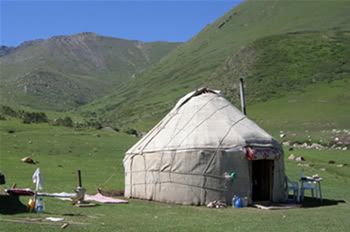
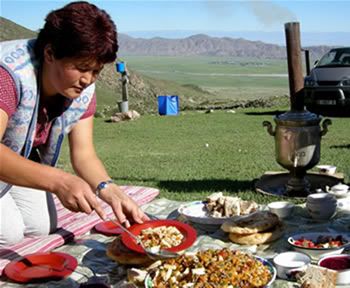
The day was perfect. Prior to our
departure from Bishkek, our boss had called to tell us to bring warm clothes
and rain gear, as it had been cold and rainy all week. However, we were greeted
by perfect blue skies and ideal temperatures. From our breakfast blanket, we
could look out across the jailoo, dotted with livestock, to the valley below.
Beyond the valley, behind a small rise of mountains, we could even see the
glistening blue waters of Lake Issyk-Kul. Paradise.
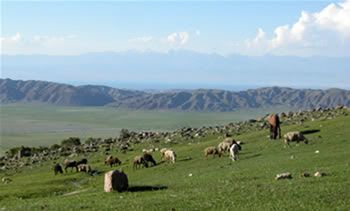
While we were breaking our fast, an
elderly couple, distant relatives of our boss who reside nearby, ambled over.
The man was 87 and the woman was 78. They both continue to live in the jailoo
and care for livestock as they have for all of their lives. They invited us to
come with them to watch them milk their horses and prepare kumis, a traditional
Kyrgyz beverage made from fermented mare’s milk. They care for a small herd of
horses, and had perhaps 20 mares and at least 10 foals. The man would lead a
foal to its mother and allow it to nurse briefly. Then, as he led the foal
away, the woman would begin milking the mare. They did this with every
mare/foal pair, then invited us to their home to sample the kumis. The fresh
milk was added to a large barrel of kumis, then stirred briskly. We were each
poured a small bowl of kumis. The milk tasted sour, and had a smoky taste from
the barrel. It was good, but difficult for us to drink quickly. Meanwhile, the
man had an incredibly large bowl of kumis which he chugged in one gulp.
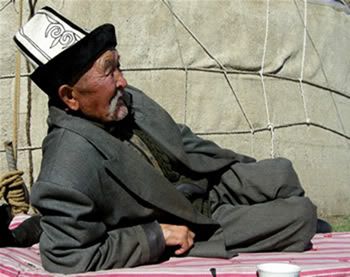
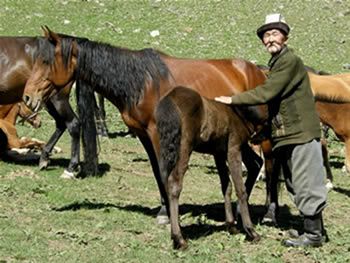
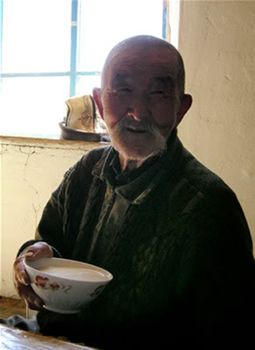
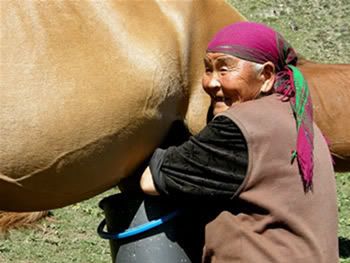
We returned to “our” yurt, and found that
horses had been rounded up for our ride. Kumar, our boss’s son, rode the head
stallion of the herd we’d just seen milked, while the rest of us were given
horses rented from Kul-Tur, the nearest village in the valley below. I was
quite pleased with my horse (although I would’ve much preferred the beautiful
and spunky stallion) as he was both energetic and well-behaved. I felt quite
comfortable riding him. B also had a pretty good horse. K’s horse was sluggish,
while J’s was just plain lazy. Plus, I swear these were the gassiest horses in
Kyrgyzstan. As mature as we all pretend to be, we couldn’t help laughing; a
seven hour trek and these beasts were just as gassy at the end as they were at
the beginning!
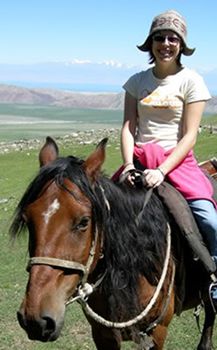
We rode up a steep valley lining a small
stream, zig-zagging back and forth to make the journey easier on the horses.
After about three hours, we reached a high point, with an incredible view of
the valley. There we dismounted and unpacked our stellar picnic. We ate and
then had a pleasant nap before saddling back up and continuing to head upwards
towards Sunken Pass.
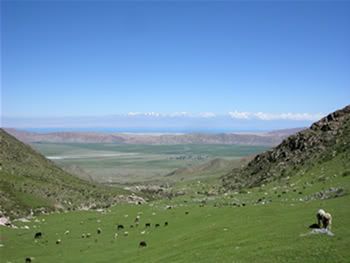
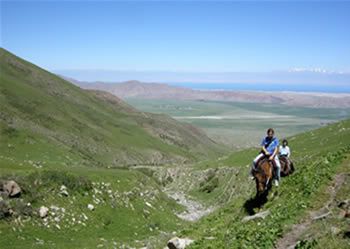
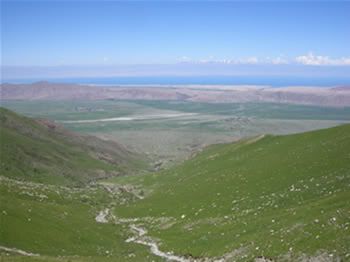
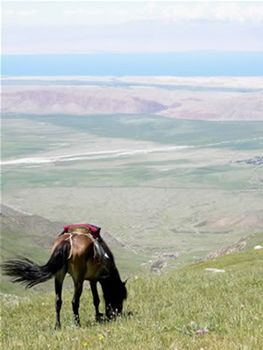
For most of our trek, we were not
following any recognizable path (although occasionally a well-worn track would
appear out of the weeds only to vanish again); however, as we neared Sunken
Pass, the “path” widened to the point that it almost looked like a road! We
reached the top of the pass and the view of the next valley was stunning. We
all wished that we had time to continue on, instead of returning back the way
we came. But, we had to get back. After four more hours in the saddle,
zig-zagging our way back down the mountain, we returned to the yurt.
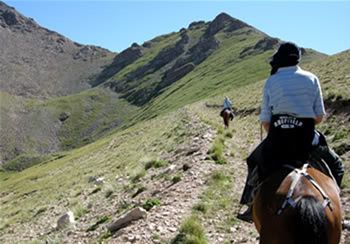
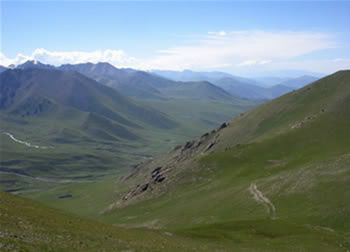
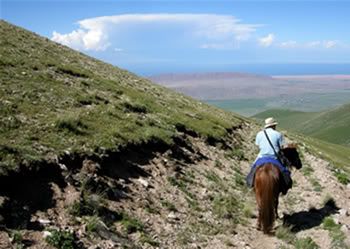
After a delicious dinner, eaten while watching the
sun set through the yurt’s door, we quickly made preparations for bed. B and J
were given a tent, although K and I got to sleep in the yurt with everyone
else. The yurt had a stove inside (fueled by wood and dried manure) which meant
that even though the temperature dropped rapidly outside once the sun set, we
remained warm and cozy all night.
In the morning, the plan had been for us to go hiking; however, this was
hampered by two things: we were all incredibly sore from having spent seven
hours in the saddle, and the weather was overcast and chilly. We went on a
short hike, but were relieved to return to the yurt to relax.
After lunch (this time joined again by the elderly couple as well as by a middle-aged
couple who were also living nearby) we packed up our things and piled back into
the van. By the time we reached the valley floor, the jailoo was already masked
from view by rain.
The plan had been to stop at Issyk-Kul for a brief swim before starting our
journey home, but the weather had turned cold and rainy, so that was not to be.
Instead, we took some shivery photos of the lake then popped back into the van
for the trip home.

No comments:
Post a Comment